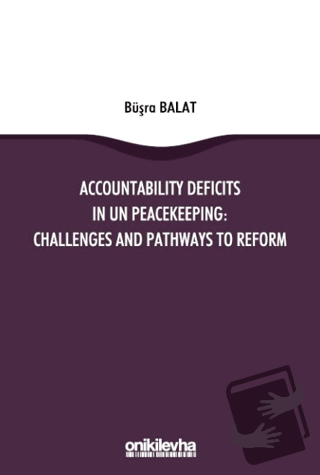Accountability Deficits in UN Peacekeeping: Challenges and Pathways to Reform

This compelling book delves into the critical issue of accountability within the United Nations (UN) peacekeeping operations, with a particular focus on its global governance role and human rights responsibilities. Through a comprehensive socio-legal approach, it explores whether the UN can be held accountable for breaches of international law and its own obligations. By analyzing the concept of accountability and its importance in preventing power abuses, the book reveals that existing mechanisms are inadequate in ensuring transparency and meaningful justice.
The study takes an in-depth look at real-world cases, such as allegations of sexual exploitation and abuse by UN peacekeepers in the Central African Republic, to highlight how gaps in the UN's accountability framework hinder efforts to protect human rights and prevent misconduct. It argues that the failure lies in unclear rules, ineffective mechanisms, and the misuse of immunity protections, ultimately preventing victims from accessing justice.
While this book does not offer a specific solution, it emphasizes the need for stronger accountability mechanisms within the UN and suggests that non-legal avenues may play a crucial role in holding the organization accountable as a political institution. Insightful and thought-provoking, this book is essential reading for those interested in international law, global governance, and human rights.
| Taksit Sayısı | Taksit tutarı | Genel Toplam |
|---|---|---|
| Tek Çekim | 446,25 | 446,25 |
| 3 | 162,55 | 487,66 |
| 6 | 85,82 | 514,93 |
| 9 | 60,25 | 542,24 |
| 12 | 47,45 | 569,46 |
| Taksit Sayısı | Taksit tutarı | Genel Toplam |
|---|---|---|
| Tek Çekim | 446,25 | 446,25 |
| 3 | 162,55 | 487,66 |
| 6 | 85,82 | 514,93 |
| 9 | 60,25 | 542,24 |
| 12 | 47,45 | 569,46 |
| Taksit Sayısı | Taksit tutarı | Genel Toplam |
|---|---|---|
| Tek Çekim | 446,25 | 446,25 |
| 3 | 162,55 | 487,66 |
| 6 | 85,82 | 514,93 |
| 9 | 60,25 | 542,24 |
| 12 | 47,45 | 569,46 |
| Taksit Sayısı | Taksit tutarı | Genel Toplam |
|---|---|---|
| Tek Çekim | 446,25 | 446,25 |
| 3 | 162,55 | 487,66 |
| 6 | 85,82 | 514,93 |
| 9 | 60,25 | 542,24 |
| 12 | 47,45 | 569,46 |
| Taksit Sayısı | Taksit tutarı | Genel Toplam |
|---|---|---|
| Tek Çekim | 446,25 | 446,25 |
| 3 | 162,55 | 487,66 |
| 6 | 85,82 | 514,93 |
| 9 | 60,25 | 542,24 |
| 12 | 47,45 | 569,46 |
| Taksit Sayısı | Taksit tutarı | Genel Toplam |
|---|---|---|
| Tek Çekim | 446,25 | 446,25 |
| 3 | 162,55 | 487,66 |
| 6 | 85,82 | 514,93 |
| 9 | 60,25 | 542,24 |
| 12 | 47,45 | 569,46 |
| Taksit Sayısı | Taksit tutarı | Genel Toplam |
|---|---|---|
| Tek Çekim | 446,25 | 446,25 |
| 3 | - | - |
| 6 | - | - |
| 9 | - | - |
| 12 | - | - |
This compelling book delves into the critical issue of accountability within the United Nations (UN) peacekeeping operations, with a particular focus on its global governance role and human rights responsibilities. Through a comprehensive socio-legal approach, it explores whether the UN can be held accountable for breaches of international law and its own obligations. By analyzing the concept of accountability and its importance in preventing power abuses, the book reveals that existing mechanisms are inadequate in ensuring transparency and meaningful justice.
The study takes an in-depth look at real-world cases, such as allegations of sexual exploitation and abuse by UN peacekeepers in the Central African Republic, to highlight how gaps in the UN's accountability framework hinder efforts to protect human rights and prevent misconduct. It argues that the failure lies in unclear rules, ineffective mechanisms, and the misuse of immunity protections, ultimately preventing victims from accessing justice.
While this book does not offer a specific solution, it emphasizes the need for stronger accountability mechanisms within the UN and suggests that non-legal avenues may play a crucial role in holding the organization accountable as a political institution. Insightful and thought-provoking, this book is essential reading for those interested in international law, global governance, and human rights.










